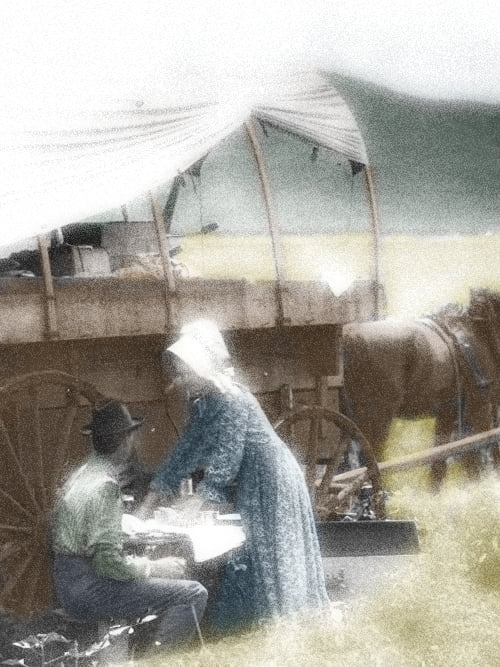In 1849, Sarah Royce, her husband, and two-year old daughter Mary left from Missouri on the overland route. They had left in April, crossed the Mighty Missouri River and crossed the planes, suffered from tremendous thunderstorms, windstorms and hail. They crossed the Rockies, rested briefly in Salt Lake, then plunged through one of the most inhospitable regions of the world, the vast, empty treacherous great basin. On October 4th, 1849 they were in sight of the last great barrier to Sacramento-the Sierra Nevada. They were low on food and almost out of water. They had been separated from the small wagon train that had traveled with, and were now alone in the Forty-Mile desert. They had to hurry and try and cross the mountains before the snow flew and shut the passes. Their four oxen were exhausted and starving. Then they missed the turnoff on the main route, and went sixteen miles in the wrong direction before they realized their mistake.
They had to turn back. “Turn back,” Sarah Royce wrote in her journal. “What a chill the words sent though my body. Turn back on a journey like that, when every mile had been gained by the most earnest labor, growing more and more intense with every step. No steps seemed so heavy, so hard to take as those when I turned my back to the sun that afternoon. Only a woman who has been alone upon a desert with her helpless child can have any idea of the experience.”
They were in a dry and dreary land, surrounded by the wreckage of wagon trains, flies and the stench of dead cattle. “Mama, I want a drink,” little Mary said, and Sarah gave her the last of the water. Sarah stumbled on, mumbling the words, “let me not see the death of my child,” over and over.
They struggled to the eastern base of the Sierra Nevada. Scouts on horseback, sent from Sacramento, scoured the mountain passes as the migration season came to a close. A wagon train that had ascended the pass ahead of them told the scouts of the family that was still in the desert. The scouts said they did not have legal authority to go out of California and into the desert. But one of the women in the camp asked for their orders and ripped them up. “Now go after them,” she told the two young soldiers. They reached the lonely wagon and pulled them up over the mountains as the snow began to fly, and they were reunited with the wagon train. After some rest they began their descent down the mountains. She remembered, “One morning I walked ahead of the group. Rounding a bend in the road, the cliff fell away and I looked down, far over constantly descending hills. I saw a warm, rosy glow that seemed to me a smile of welcome. I realized I was looking across the Sacramento Valley. California, land of sunny skies—that was my first look into your smiling face. I loved you from that moment I saw you—for you welcomed me with love into rest and safety. I spent a moment in thanksgiving and prayer. Then the others arrived, and their loud shouts and songs made the rocks ring under the vault of heaven.”
Mary and Sarah made it into Sacramento. They moved around a bit and settled in Grass Valley. Today one of the few reminders of her is the Royce Library. Sarah and her husband had another daughter, then a son, Josiah. Josiah went to the University of California, Berkeley then to Harvard, and became one of America’s great philosophers.
